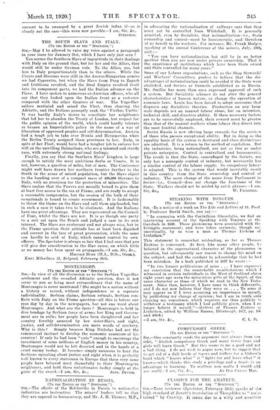NATIONALIZATION IN RUSSIA. [To THE EDITOR OF THE " SPECTATOR."]
SIR,—The efforts of the Bolsheviks in Russia to nationalize indlistries are instructive. The miners' leaders tell us that they are opposed to bureaucracy, and Mr. J. H. Thomas, M.P., in advocating the nationalization of railways says that they must not be controlled from Whitehall. It is generally admitted, even by Socialists, that nationalization—i.e., State ownership and control—must be bureaucratic, and therefore of no benefit to the workers. For instance, Mr. Frank Hodges, speaking at the annual Conference of the miners, July, 1914, said :— " You can have nationalization but still be in no better position than you are now under private ownership. That is the experience of institutions which have been State owned and State controlled for many years."
Some of our Labour organizations, such as the Shop Stewards and Workers' Committees, profess to believe that the dis- advantages of nationalization could be avoided if the State were abolished, and Soviets or Councils established as in Russia. Mr. Smillie has more than once expressed approval of such a system. But Socialistic schemes do not alter the general characteristics of human nature, or change the operation of economic laws. Lenin has been forced to adopt measures that disprove any Socialistic theories. Production on any large scale depends not on manual labour alone, but on invention, technical skill, and directive ability. If these necessary factors are to be successfully employed, their reward must be greater than that of the manual workers whose labour they direct into the most fruitful channels.
Soviet Russia is now offering large rewards for the service's of those who possess exceptional ability. But in doing so the equality basis of the system is destroyed and class distinctions are admitted. It is a return to the method of capitalism. But the industries, being nationalized, are not as free as under private enterprise. Control is centralized and bureaucratie. The result is that the State, camouflaged by the Soviets, not only has a monopoly control of industry, but necessarily has a similar control of the labour supply. So compulsory labour is adopted. This is the system that would inevitably result in this country from the State ownership and control of industry. The mere change of the name from Parliament to Soviet—i.e., Council—does not change the functions of the State. Workers should not be misled by catch phrases.—I am,










































 Previous page
Previous page